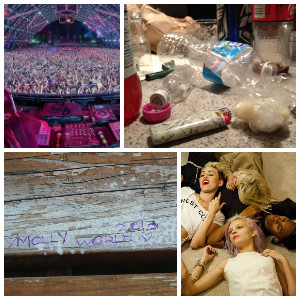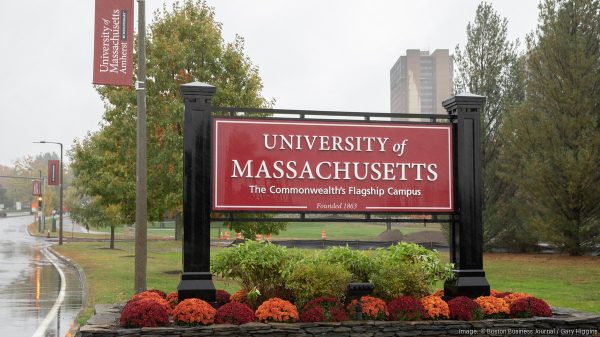Molly tempts curious students

Photo illustration by Courtney Marcil
From courtyard graffiti, to local parties, to pop songs, the drug molly has made its way into the media, and into South Hadley.
Molly has become the dominant and popular drug of choice for young people attending concerts, parties, and other events in the past year. “It was so big last year it was ridiculous!” a male junior said about molly. This problem has led to a number of students with heightened curiosity, and resulted in students experimenting with the drug.
Molly is a form of ecstasy which is referred to as the “purest” form of MDMA, but usually is laced, or cut wrong, making it even more dangerous for those who take it. It’s supposed to be a club drug that makes users feel hyped up. Since the early 2000s, the drug has been on the uprise and it’s finally reaching teens. Resource Officer Steve Fleming warned students not to trust or take anyone’s word when it comes to what students put in their body.
A junior male described his experience taking it and said, “you feel upbeat, and your mind will race.” He listed some of the other side effects by saying he “got no sleep and was up all night, had huge pupils, was sweating, and definitely talking excessively.” The Drug Enforcement Administration considers molly a schedule 1 controlled substance, meaning that there is no accepted medical use, and has a high potential for abuse. A different junior male said “I didn’t like it, it was too easily addictive…it just started as a fad.”
In a school wide survey taken anonymously by just under 100 students 87% admit that they know someone who has used molly, and 24% admit to actually trying the drug themselves. Principal Diana Bonneville reacted with much concern for students when the statistics of the survey became known to her and said that the high school “has a drug usage problem.” In the same survey, 80% denied ever being peer pressured into trying it, yet 24% of the students surveyed admitted to actually trying the drug. Out of the students who did try the drug, the most common motive was personal curiosity.
In that anonymous survey, the majority wrote that they had heard about the drug last spring. Part of the reason teens knew about the drug long before their parents found out, is because of all the publicity it has gotten that parents weren’t hearing about. There are many songs that mention it, and some songs where the whole message is “molly is great.” These include the song “Molly” by Tyga that repeats the word 28 times in a row, twice throughout the song. Also, Trinidad James’ catchy line from his song “All Gold Everything” that says “Popped a molly, I’m sweatin’ woo,” which students have been heard to sing through the hallways. Also, Miley Cyrus, who most teens still think of as Hannah Montana, admits to her song “We Can’t Stop” actually saying “We like to party, dancin’ with molly doin’ whatever we want.” The song’s audiences are students in high school, not their parents; and most parents are just finding out about the drug now. “Putting it in the media doesn’t necessarily glorify it, but it does bring it to light, adding to kids’ curiosity,” said Fleming.
The high school has tried to take this drug problem into its own hands. This will be the first year that juniors will be required to take a health class. Bonneville said “45 days of health freshman year is not enough and will not fully stick with students.” She said she hopes that this extra semester of class will help educate students on new drugs and remind them of the dangers of traditional commonly abused drugs. Also this addition should help prevent drug and alcohol usage, and teen pregnancy as well.
The drug is now being publicized to all audiences. It has recently became a popular news story when many concerts and events at the Mullins Center were cancelled. UMASS lost revenues of $18,500 just from one concert, ‘Return to Fantazia,’ according to masslive.com. People found out about the deaths molly has been causing and wanted to try and control the use of it. A lot of students at our own school were extremely upset about the cancellations, just wanting to enjoy their electronic dance music. The cut-backs on concerts have not stopped either.
The National Drug Abuse Warning Network found that from 2004 to 2009, there was a 123 percent increase in the number of emergency room visits involving MDMA taken alone or in combination with alcohol. “Alcohol and molly is a very dangerous combination,” noted a female senior. She denied ever trying it personally, due to the uncertainty of the quality of the drug. Fleming stressed that “you really don’t know what’s in it. Think about anything you’re putting in your body, be smart.” He warns students not to trust someone or take their word when being offered molly or any other drug.



